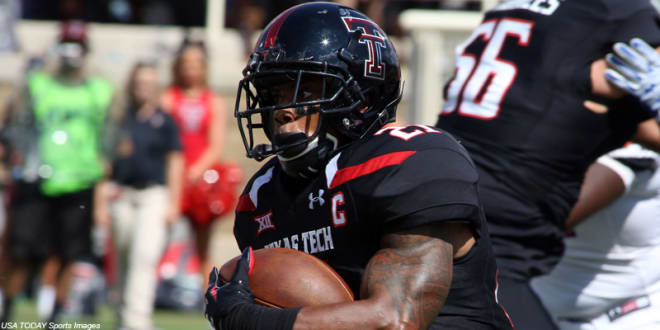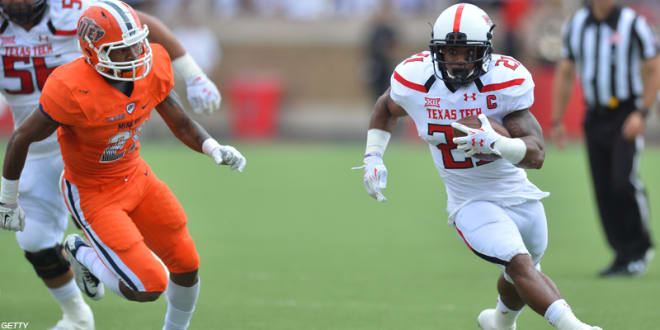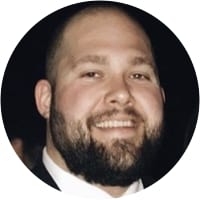Scratching & Clawing: Washington's path to top Air Raid tailback

“What’s up big dog?” or “How’s it goin’, Boss?”
That’s the way that Texas Tech running back DeAndre Washington always addresses me, one way or the other. He did it when he was 17 as a senior prospect, tearing up the competition at Fort Bend Marshall High School, and he still does it today any time I see him after a practice at the Football Training Facility, warming up before a game, or walking up to the podium for a post-game press conference. That’s him.
Dre has a way about him that’s not common. What I mean is he’s just a different cat, as he’d probably say.
He’s laid back, Houston-built, and one of the easiest people to interact with you’ll ever meet. But there’s this simmering, smoldering intensity right under that H-Town, Mike Jones, easy-swervin-and-swangin top layer. You can see it and hear it when he starts talking about goals and desires, football or not. That’s what makes him a different cat. To really understand where I’m going with this, you need to go back to the starting line of his college football career. Back to Missouri City.
In late summer of 2011, Washington essentially narrowed down his college decision to two schools: Tech and Oklahoma State. He, obviously, picked the Red Raiders and decided he wanted to head out to West Texas, a place he felt comfortable from the get-go.
“The atmosphere, Lubbock, the fans, the people, and just the opportunity, I think. It felt like I could come to Tech and have an opportunity to play early, play against some good talent in the Big 12. Overall, it was just the opportunity, though. I just felt like I had the opportunity to make a name for myself.”
And make a name for himself in 2011 DeAndre would. Sure, he started out as a spot player for then-feature back Eric Stephens early on in the year, but a season-ending knee injury for the veteran against A&M would change the course of the season and the immediate trajectory for the true freshman backup.
That trajectory, as it would happen, had him crash land like a bottle rocket right onto the field at Gaylord Family Oklahoma Memorial Stadium on a storm ridden night in Norman.
Washington flashed right in front of Red Raider fans’ eyes for the very first time that evening, making several key, top-of-the-highlight-reel runs that pushed Tech towards their biggest win of the Tommy Tuberville era.
“That was crazy. That was freshman year, head was still spinning, kind of really my first real road test. We played lights out that game, man. That was really kind of my first real taste of what college football really is. Upsetting a team like that on the road, everything that it meant, they had like a forty game winning streak or something like that at the time. At the time, it was the biggest thing I’d done to my career up to that point.”
You talk to guys all the time that want to downplay their first big moments in college football. They don’t often tell you about their heart trying to scratch, claw, and gnaw its way out of their chest and through their shoulder pads.
DeAndre, like he usually does, got straight to the point.
“Without a doubt. If I told you otherwise, I would be lying to you. It was on the road in a hostile place, I was a freshman, and like I said, they were like the number two or number three team, and I could definitely feel my heartbeat racing at the beginning of the game. But, once things got going, I got comfortable and was ready to go.”
That 80 plus yard night after a tense rain delay was like a flare in the dark for Red Raider fans and Washington’s teammates: He had the goods, and he had a bright future. That presumed future was put on hold a bit, however.
Missouri’s turf became a notorious knee fiend in 2011, claiming multiple players to season-ending ACL tears and the such. The true freshman from Houston was one of its final victims, and it cost him the entire 2012 season with a long and arduous year of rehab.
It was a tough season to sit through, which Dre makes no bones about.
“Man. It was a grind, man. We’re talking late nights, early mornings, long nights, just a grind. I had a lot of free time on my hands, so I was just constantly trying to do some things just to get back on the field, just working with the strength and conditioning coaches. Just to sum it up, it was a grind, honestly.”
We often look back on the adversity in our life and laugh a little bit. In retrospect, the toughest issues to work and fight through end up paying off the most in the long run towards success. Washington certainly believes that about his knee injury when taking perspective on what it eventually molded him into.
“More so, it just helped me mentally. I think it definitely built me, made me stronger mentally more than anything. Of course, it was really important to do a whole lot of rehab, but mentally it was a big thing because I’d never had an injury like that before. It definitely helped build me mentally. The injury happened, and I wouldn’t change it for nothing. If I could go back and do it, I wouldn’t redo it at all.”
Coming back in 2013 as a redshirt sophomore, Washington was ready to roll. Or at least he thought he was. Knee injuries are notorious for being a bit of a phantom, even after you’ve finished off your rehab.
There’s a give and take relationship when it comes to cutting on that knee, and everyone has to find that comfort zone in their own time to become truly effective and electric as an athlete again. On top of that issue, Washington had to deal with a new position coach in former Cibolo Steele High School coach Mike Jinks.
Both parties have to feel each other out, and Jinks didn’t know what to think of DeAndre’s talent out of the gate. Once the tailback found himself again, the newly christened head coach at Bowling Green knew he had something special.
"Coach Kilmer and some of these guys that have been around were constantly telling me, 'Coach, he's got a burst.' I was like, 'Well where is it?'," he laughed. "So, it was tough on him. He had to learn to trust that leg again, and he had to do it the old fashioned way. He worked and worked and worked. It was probably that second spring that I thought, okay, this kid is pretty special. He's only gotten better since then."
After splitting time with Kenny Williams in that 2013 campaign, Washington’s hard work finally paid off. He fought his way back to the top of the depth chart, and going into his junior campaign in 2014, he was determined to be what everyone saw glimpses of at Oklahoma as a freshman.
“I just felt like it was my time. I felt like I had been here going on two and a half, three years at that point, and I felt like it was my time. I felt like someone really needed to fill that role, so why not me? I just put my all into it that whole offseason, the whole summer, and by the grace of God I was able to earn that starting position.”

You wonder what guys will do with an opportunity once it’s afforded to them. Will they coast? Will they thrive? Washington did the latter, taking off like a rocket and soaring higher than any other running back in essentially two decades.
It’s really something else. No Tech back had eclipsed 1,000 yards rushing in a season on the South Plains since Spike Dykes was roaming up and down the sidelines. To focus that perspective even more, the last time someone hit the 1K mark, I was busy learning to write in cursive, and poorly at that, in elementary school.
Washington did it in back-to-back years, forcing his way into the conversation as one of the best RBs in school history with a scorching finish to this season, burning ever brighter as the season came to a close.
Many tailbacks will start off the year hot, but they lose momentum as the tolls of physicality and physics build up down the stretch. Washington did the opposite, getting better and better with each carry in each game. That resulted in one of the best days in school history on the ground with 248 yards, three touchdowns, and a 9.19 yard per carry average against Kansas State – who was the top ranked rush defense in the Big 12 at the time - on Senior Day. Put a 173 yard, two TD performance against Texas in Austin in the regular season finale as the cherry on top, and Coach Jinks just feels privileged to have seen his senior leader do something so unique.
"I tell you what, it was special, because he deserves it. Once you learn a little bit about his story, battling back from that ACL, had to come in and split time with Kenny Williams for a little while, and just not feeling himself, then watching him grind and grow, it's been very inspirational to me and the rest of our football team.”
Jinks isn’t the only person in line to heap praise on Washington, either. One of the guys that’s been crucial to his success, senior center Jared Kaster, gushes about his fellow Houstonian. He’s seen what Washington’s done in the dark, quiet hours when no one else has been watching. He knows just how much effort the running back has put in to become what he is.
“Like I tell everybody else, that’s just who he is. It’s great to see all his hard work come together and to really show. The guy the first one in here other than Coach Kingsbury. He’s the first player in here, and he’s the last one to leave. He’s out at practice 15 minutes before everybody else, just whatever it takes to get his body and his mind right. It just goes to show what hard work really does for someone. It’s fun. It’s really fun to block for a guy like that, and it’s fun to play with somebody like that. Seeing what Dre has done, kudos to him. I’m happy for him. All of us are happy for him up front. We’ve all worked together to try and get him to where he wanted to be.”
So with 2600 yards on the ground in his final two seasons in Lubbock, Washington has shattered the once touted, banner-flag myths about Air Raid offenses. 1,000 yard seasons have long been an afterthought for running backs in the system, but Dre has proven that it’s not only possible but plausible.
“More than anything, it proved that it can happen in this offense. It showed that it’s not impossible for a running back in an Air Raid offense. It’s not something that’s impossible to do. It just shows some of the younger running backs, that maybe even if you were skeptical about going to a major passing school, that once you get your opportunities, it’s really up to you what you do with them. It’s definitely possible.”
And now, as the fifth ranked yardage rusher in school history, Washington is now brushing shoulders with the likes of James Gray, Ricky Williams, Bam Morris, and Byron Hanspard, the only other backs ahead of him on the list and the four best players at the position to ever suit up for the Red Raiders.
Washington admits it would’ve been hard to talk the 17 year old version of himself into believing he could be one of the best to ever take handoffs at Jones Stadium. Now it’s a reality, and he just feels grateful to even be remotely mentioned with the other elite runners at Tech.
“Honestly man, it’s just a blessing. To be in the same sentence as some of those guys, and having been able to meet some of those guys, just to understand their stories and them to know my story, it’s just a blessing to be in the same sentence as some of those guys.”
The story isn’t finished, though. The grand finale will begin on Tuesday night in his hometown against local SEC powerhouse LSU in the Texas Bowl, a chance for Washington to close his career with an incredible crescendo.
“I honestly couldn’t have asked for much more. Besides the Playoff or one of those (New Year’s Six) Bowls, finishing it in my hometown against LSU, I think that’s really the biggest deal, biggest thing that could’ve happened for me. It gives us a chance to showcase our offense, showcase how good we can be, so I’m excited for it.”
When the final book is written on the tailback from south Texas, it will certainly be stuffed to the gills with praise for his accomplishments and contributions to the Texas Tech football lorebook. And while the results on the field will always be there as reminders of his success, Washington will always remember the things most fans never saw.
“Just the relationships that I’ve built with these guys, the different sets of teammates here each year, just the work that goes into putting together a team. Not just the group of guys out there, but the things that go into an actual team, just the whole process that it takes to go through that. I’m definitely going to miss that and just the atmosphere on Saturday afternoons and evenings in Jones Stadium, really just Lubbock in general. I’ve had some good times out here in Lubbock man. Lubbock will always have a special place in my heart.”
That’s why he’s a different cat.
